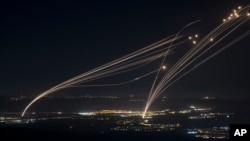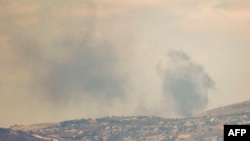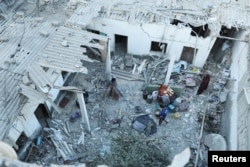Tensions heightened Sunday in the Middle East, with the U.S. moving warships to the region to defend Israel if Iran attacks, while several Western governments urgently told their citizens to leave Lebanon as Hezbollah launched a barrage of strikes targeting Israel.
France warned of “a highly volatile” situation following last week’s Israeli airstrike on a Beirut building that killed a Hezbollah commander, Fouad Shukur, and hours later Hamas political leader Ismail Haniyeh was assassinated in Tehran in a killing that Iran blamed on Israel.
The United States, France, Canada and Britain all told their citizens to leave Lebanon, and neighboring Jordan also did so. Several airlines suspended or curtailed service to the region.
Jonathan Finer, the White House National Security Council deputy adviser, told CBS’ “Face the Nation” show, "Our goal is de-escalation, our goal is deterrence, our goal is defense of Israel."
“We are preparing for every possibility,” Finer told ABC’s “This Week” show, while adding, “We do not think a regional war is in anyone’s interest.”
After Haniyeh was assassinated last week in Tehran in a guesthouse he was staying in shortly after attending the inauguration of Iran’s new president, Iran’s supreme leader, Ayatollah Ali Khamenei, said in a statement, “We consider it our duty to take vengeance.” He ordered a direct strike on Israel in retaliation for the killing of Haniyeh, according to a New York Times report citing three Iranian officials on background.
White House national security spokesperson John Kirby told “Fox News Sunday,” “When the supreme leader says he’s going to respond, we have to take that seriously. We have to make darn sure we’re ready.”
U.S. President Joe Biden, asked by reporters Saturday if he thought Iran would stand down, said, "I hope so. I don't know."
The top U.S. diplomat, Secretary of State Antony Blinken, spoke Sunday with the G7 foreign ministers to discuss the urgent need to calm tensions in the Middle East.
A State Department spokesperson said Blinken and his counterparts “reiterated their commitment to Israel’s security and urged maximum restraint from all parties to keep the conflict from escalating.”
The Israeli military said Lebanon's Iran-backed Hezbollah militants fired 30 projectiles toward the northern part of Israel overnight Saturday into Sunday but that it had knocked down most of them. The two warring sides have traded near-daily fire since the Israeli-Hamas war started in Gaza nearly 10 months ago.
Even as Israel is on high alert anticipating an attack from Tehran, medics and police said two people were killed Sunday in a stabbing attack in a Tel Aviv suburb.
The assailant, a Palestinian from the Israeli-occupied West Bank, was "neutralized" by police and taken to hospital, where he was pronounced dead.
Meanwhile, fighting raged on in Gaza, as the Israeli war with U.S. designated terror group Hamas nears the 10-month mark with no end in sight.
Israel has vowed to destroy Hamas in retaliation for its October 7 terror attack that killed 1,200 people and led to the capture of 250 hostages. Israel’s counteroffensive has killed at least 39,550 people in Gaza, according to the territory's Hamas-run health ministry, which doesn’t distinguish between combatants and civilians in its count.
Haniyeh, Hamas' political chief, was the group's lead negotiator in efforts to reach an agreement on an elusive cease-fire. His killing raised questions about the continued viability of efforts by Qatari, Egyptian and U.S. mediators to broker a truce and exchange of hostages held by Hamas and Palestinian prisoners jailed by Israel.
On the ground in Gaza, the Palestinian Red Crescent said eight bodies had been recovered from a residential building in north Gaza's Jabalia refugee camp after an Israeli airstrike.
Medics at central Gaza's Al-Aqsa Martyrs hospital said at least five people were killed and 16 wounded in an Israeli drone strike on tents housing displaced Palestinians at the medical complex, with a separate attack on a house nearby in the same area killing three.
The Israeli military said its air forces struck about 50 terror targets throughout Gaza in the past 24 hours.
Haniyeh's killing "has brought the Middle East to its moment of greatest peril in years," the International Crisis Group think tank said in a report issued Saturday.
"The risk of a spiraling conflagration is high," with the potential for a miscalculation that would trigger a war "without constraints ... likely greater now than it was in April," the last time Iran directly attacked Israel, to little effect.
On April 13, Iran launched its first ever direct attack on Israeli soil, firing a barrage of drones and missiles — most of which were intercepted — after a strike killed Revolutionary Guards at Tehran's consulate in Damascus.
The International Crisis Group said that securing "a long overdue cease-fire" in Gaza was "the best way of meaningfully reducing tensions in the region."
Finer said on CNN, “We want the parties back at the table” negotiating a cease-fire. “There’s no deal in place. There should be a deal in place. We need to turn the temperature down.”
Hamas officials, some analysts, and protesters in Israel have accused Prime Minister Benjamin Netanyahu of prolonging the war to safeguard his ruling hard-right coalition.
On Sunday, Netanyahu told his Cabinet he was "making every effort" to return the hostages and was prepared "to go a long way" to do so.
Some material in this report came from The Associated Press, Reuters and Agence France-Presse.










